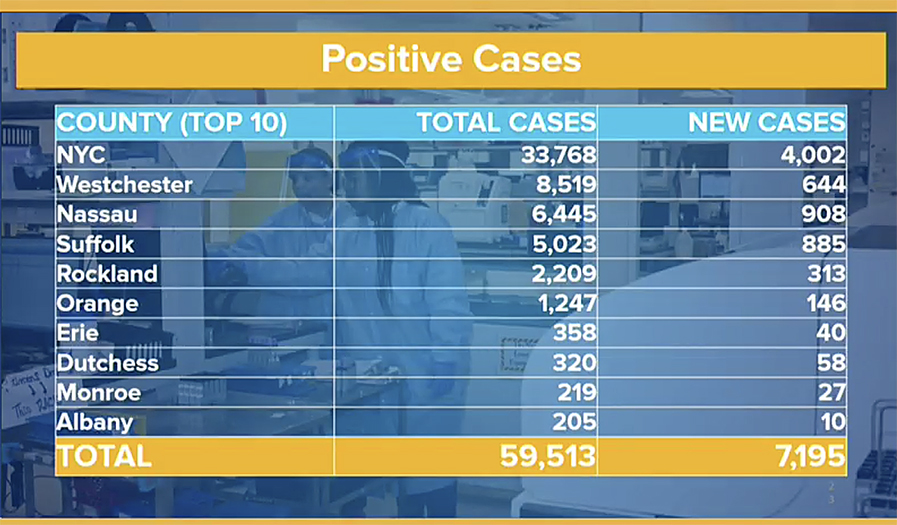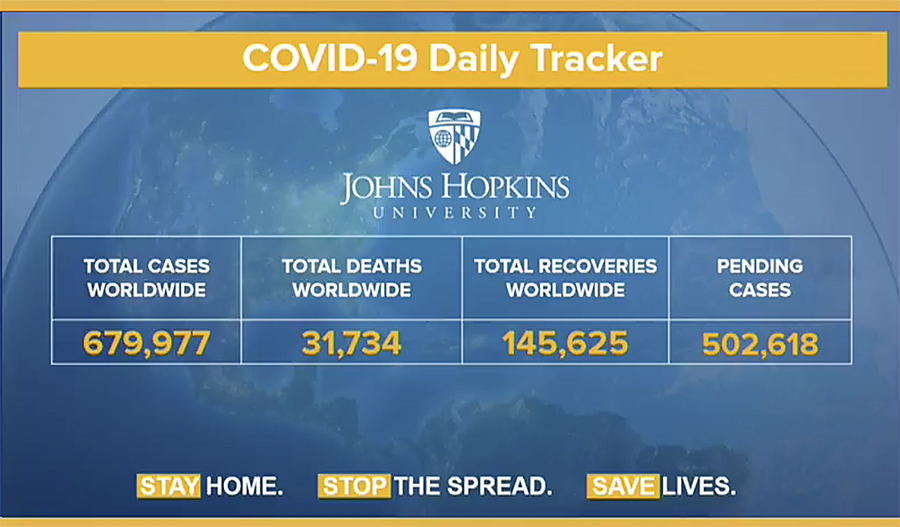COVID-19 LATEST: Cuomo says virus and nursing homes a ‘toxic mix’; 8,519 cases in Westchester
Fast Facts:
-
The governor said that nonessential workers in the state should continue to work from home for an additional two weeks through April 15
-
He reiterated that the domestic travel advisory issued by the CDC for New York, Connecticut and New Jersey was not a “lockdown”
-
An executive order by the Rhode Island governor to exclude New Yorkers from the state was repealed
-
76,019 health care workers have volunteered to help existing staff
-
Number of deaths in the state rose from 728 to 965
-
Westchester had 644 new cases bringing its total to 8,519
-
ICU admissions in the state rose from 172 on Friday to 282 on Saturday, bringing the total to 2,037
-
Total new hospitalized patients rose from 847 to 1,175 over the same two days
-
8,503 people are currently hospitalized
-
3,572 people have been discharged from hospitals
-
59,513 people have tested positive
-
The hospital ship USNS Comfort will arrive tomorrow at Pier 90 on the Hudson River
 Shortly after Dr. Anthony Fauci, director of the federal government’s National Institute of Allergy and Infectious Diseases, said on CNN’s “State of the Union” that the COVID-19 pandemic could result in from 100,000 to 200,000 deaths in the U.S., Gov. Andrew M. Cuomo said at an Albany news conference this afternoon that the death toll in New York state has reached 965, up from yesterday’s figure of 728.
Shortly after Dr. Anthony Fauci, director of the federal government’s National Institute of Allergy and Infectious Diseases, said on CNN’s “State of the Union” that the COVID-19 pandemic could result in from 100,000 to 200,000 deaths in the U.S., Gov. Andrew M. Cuomo said at an Albany news conference this afternoon that the death toll in New York state has reached 965, up from yesterday’s figure of 728.
Cuomo said that patients who have been in nursing homes account for about one-quarter of the COVID-19 deaths, calling the virus and nursing homes a “toxic mix.”
“This virus preys on the vulnerable. It preys on seniors. It preys on people with compromised immune systems and uderlying illnesses. And coronavirus in a nursing home can be like fire in dry grass,” Cuomo said.
Cuomo said there have been 8,519 cases identified in Westchester, 33,768 in New York City, 2,209 in Rockland, 1,247 in Orange and 320 in Dutchess. So far, 172,360 people have been tested for the virus in New York state with 32,513 of those tests being run on Westchester residents.
Cuomo reported that New York state had 59,513 cases of COVID-19. There were 129,767 cases in the entire U.S. New Jersey had the second highest number of cases at 11,124.
Cuomo said that he was glad President Trump backed down on his threat to impose a quarantine on New York and parts of Connecticut and New Jersey and said that last night he had received phone calls from frightened New Yorkers in a panic wanting to know how quickly they needed to get out of the state.
He said the statement issued last night by the Centers for Disease Control and Prevention urging a voluntary travel restriction made sense because it affirmed what New York and other states already were doing. He emphasized that it was not a lockdown.
In its domestic travel advisory, the CDC stated: “The CDC urges residents of New York, New Jersey and Connecticut to refrain from nonessential domestic travel for 14 days effective immediately. This domestic travel advisory does not apply to employees of critical infrastructure industries, including but not limited to trucking, public health professionals, financial services, and food supply. These employees of critical infrastructure, as defined by the Department of Homeland Security have a special responsibility to maintain normal work schedule. The Governors of New York, New Jersey, and Connecticut will have full discretion to implement this Domestic Travel Advisory.”
Cuomo said he had talked with Rhode Island Gov. Gina Raimondo and she has canceled her executive order that Rhode Island State Police stop cars with New York license plates at the Rhode Island border and ensure that any New Yorkers entering her state go into a 14-day quarantine.
Cuomo said that he has extended through April 15 the requirement that nonessential state workers work from home and said that it also applies to the private workforce as well.
Cuomo repeated his admonitions that the public and private hospital systems need to combine into a single system for treating COVID-19 patients, sharing facilities, equipment and staffs to handle the maximum number of patients.
He said there is some good news in that the number of patients being discharged from hospitals continues to rise, in line with the increases in the number of patients being admitted. He said that yesterday, March 28, 846 patients had been discharged, up from the 681 who had been discharged the day before. At the same time, he noted that 1,175 patients were admitted on March 28, up from 847 on March 27.
 Cuomo said a bright spot in the hospital admissions statistics is that the time it takes for the number of hospital admissions to double has increased from two days in mid-March to six days toward the end of the month, a possible sign that the rate of spread resulting in serious cases in the pandemic is slowing.
Cuomo said a bright spot in the hospital admissions statistics is that the time it takes for the number of hospital admissions to double has increased from two days in mid-March to six days toward the end of the month, a possible sign that the rate of spread resulting in serious cases in the pandemic is slowing.
He presented statistics showing that the number of patients being admitted to an intensive care unit for treatment was 374 on March 27, then dropped to 172 on the 28th and increased to 282 yesterday.
Cuomo said 76,019 retired health care workers have volunteered their services to help in the crisis so far. Among them are 30,334 registered nurses and 8,058 physicians.
 He said the state Department of Health Wadsworth Center laboratory has developed a new test for COVID-19 that uses a short swab to retrieve samples from the nose and throat. Many health care facilities around the U.S. have complained that they cannot test for the virus because of a shortage of the long swabs. He said using short swabs, similar to Q-Tips used by consumers, will make the testing of patients easier, faster and less intrusive.
He said the state Department of Health Wadsworth Center laboratory has developed a new test for COVID-19 that uses a short swab to retrieve samples from the nose and throat. Many health care facilities around the U.S. have complained that they cannot test for the virus because of a shortage of the long swabs. He said using short swabs, similar to Q-Tips used by consumers, will make the testing of patients easier, faster and less intrusive.
Cuomo was highly critical of U.S. Sen. Chuck Schumer and the rest of the state’s Washington representatives for not protecting the state’s financial interests in COVID-19 legislation that has been passed.
He said the first recovery bill that became law disqualified New York state from Medicaid funding and last week’s $2 trillion aid package only gave New York state the equivalent of 1.9% of its state budget while other states got 10% or 20% of their state budgets in aid.
“We have more cases than anyone else and we got the lowest level of reimbursement in the bill,” Cuomo said.
Staff writer Bob Rozycki contributed to this report.